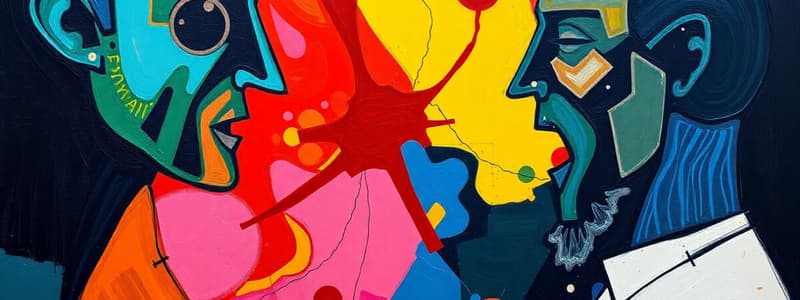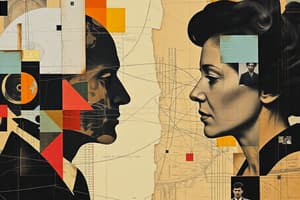Podcast
Questions and Answers
What does Conflict Theory suggest about society?
What does Conflict Theory suggest about society?
- Society functions without any disparities.
- Society is orderly and consensus-based.
- Society is divided into groups with competing ideas and values. (correct)
- Society's laws are only made for the benefit of the poor.
What is one of the main influences on legislation and administrative regulation according to conflict theory?
What is one of the main influences on legislation and administrative regulation according to conflict theory?
- Random chance
- Public opinion
- Individual morality
- Special interests and lobbyists (correct)
Members of a less powerful group always conform to the laws of the more powerful group.
Members of a less powerful group always conform to the laws of the more powerful group.
False (B)
Criminal definitions are universally accepted, regardless of societal power dynamics.
Criminal definitions are universally accepted, regardless of societal power dynamics.
What are the two forms of social control described in the content?
What are the two forms of social control described in the content?
What do laws represent in the context of conflict theory?
What do laws represent in the context of conflict theory?
According to Consensus Theory, law reflects the common interests of _____ as a whole.
According to Consensus Theory, law reflects the common interests of _____ as a whole.
In conflict theory, the dominant group has the capital to shape _____ and public policy.
In conflict theory, the dominant group has the capital to shape _____ and public policy.
Which of the following is NOT a characteristic of Conflict Theory?
Which of the following is NOT a characteristic of Conflict Theory?
Match the following aspects of conflict theory with their descriptions:
Match the following aspects of conflict theory with their descriptions:
Match the following theorists with their contributions to social theory.
Match the following theorists with their contributions to social theory.
According to conflict theory, which of the following is NOT a factor affecting who is apprehended and punished?
According to conflict theory, which of the following is NOT a factor affecting who is apprehended and punished?
Informal social control includes laws enforced by the state.
Informal social control includes laws enforced by the state.
What is a consequence of group norms differing from the norms of the more powerful group?
What is a consequence of group norms differing from the norms of the more powerful group?
The application of laws is uniform across all social groups.
The application of laws is uniform across all social groups.
Who is mainly in control of defining what constitutes a crime in society?
Who is mainly in control of defining what constitutes a crime in society?
What is the primary function of laws according to conflict theory?
What is the primary function of laws according to conflict theory?
Crime is purely an illegal act without any political implications in conflict theory.
Crime is purely an illegal act without any political implications in conflict theory.
Name one social factor that affects who is processed and punished under conflict theory.
Name one social factor that affects who is processed and punished under conflict theory.
The dominant group controls the ______ definitions that reflect their norms and values.
The dominant group controls the ______ definitions that reflect their norms and values.
Which of the following best describes the influence of special interest groups in conflict theory?
Which of the following best describes the influence of special interest groups in conflict theory?
In conflict theory, the process of lawmaking is impartial and fair to all groups in society.
In conflict theory, the process of lawmaking is impartial and fair to all groups in society.
According to conflict theory, what is the relationship between crime and power?
According to conflict theory, what is the relationship between crime and power?
Which of the following components are part of the normative system in social control?
Which of the following components are part of the normative system in social control?
Group members of lower power typically shape the laws that govern society.
Group members of lower power typically shape the laws that govern society.
What is the role of informal social control in society?
What is the role of informal social control in society?
In Conflict Theory, law is viewed as a tool for the _____ group to maintain control over society.
In Conflict Theory, law is viewed as a tool for the _____ group to maintain control over society.
Match the following terms with their definitions:
Match the following terms with their definitions:
Which of the following best describes consensus theory?
Which of the following best describes consensus theory?
Formal social control is primarily enforced through family teachings.
Formal social control is primarily enforced through family teachings.
What is meant by 'criminal behavior' in the context of Conflict Theory?
What is meant by 'criminal behavior' in the context of Conflict Theory?
Flashcards
Conflict Theory
Conflict Theory
A theory stating that the legal system and law enforcement reflect the power struggles between different groups in society, specifically that the powerful (dominant group) create the laws.
Dominant Group
Dominant Group
The group(s) holding significant political, social, and economic power to shape laws and policies benefiting their interests.
Criminal Definitions
Criminal Definitions
The actions that violate the norms and values of the dominant group(s) in society, defined as "crime".
Application of Laws
Application of Laws
Signup and view all the flashcards
Social Factors
Social Factors
Signup and view all the flashcards
Political Construct
Political Construct
Signup and view all the flashcards
Special Interests/Lobbyists
Special Interests/Lobbyists
Signup and view all the flashcards
Influence on Law and Policy
Influence on Law and Policy
Signup and view all the flashcards
Conflict Theory
Conflict Theory
Signup and view all the flashcards
Social Control
Social Control
Signup and view all the flashcards
Informal Social Control
Informal Social Control
Signup and view all the flashcards
Formal Social Control
Formal Social Control
Signup and view all the flashcards
Consensus Theory
Consensus Theory
Signup and view all the flashcards
Functionalist Theory
Functionalist Theory
Signup and view all the flashcards
Normative Consensus
Normative Consensus
Signup and view all the flashcards
Socialization
Socialization
Signup and view all the flashcards
Conflict Theory
Conflict Theory
Signup and view all the flashcards
Social Control
Social Control
Signup and view all the flashcards
Informal Social Control
Informal Social Control
Signup and view all the flashcards
Formal Social Control
Formal Social Control
Signup and view all the flashcards
Consensus Theory
Consensus Theory
Signup and view all the flashcards
Functionalist Theory
Functionalist Theory
Signup and view all the flashcards
Normative Consensus
Normative Consensus
Signup and view all the flashcards
Socialization
Socialization
Signup and view all the flashcards
Conflict Theory of Law
Conflict Theory of Law
Signup and view all the flashcards
Dominant Group
Dominant Group
Signup and view all the flashcards
Crime (from Conflict)
Crime (from Conflict)
Signup and view all the flashcards
Law Application Bias
Law Application Bias
Signup and view all the flashcards
Special Interests
Special Interests
Signup and view all the flashcards
Political Construct (Crime)
Political Construct (Crime)
Signup and view all the flashcards
Influence on Law(making)
Influence on Law(making)
Signup and view all the flashcards
Law's Symbolic Function
Law's Symbolic Function
Signup and view all the flashcards
Study Notes
Conflict Theory
- Conflict theory suggests that society is characterized by inherent conflict and power struggles between different groups.
- Power dynamics influence the creation and enforcement of laws.
- The dominant group (those with more power) shapes legislation and administrative regulations to benefit themselves and maintain their position.
- Laws represent the interests of the dominant group, not necessarily the common good.
- According to conflict theory, laws are tools for the dominant group to control society and maintain their power.
- Criminal definitions are not universal but reflect the values and interests of the dominant group.
- The dominant group controls the legal definitions which are used to define criminal behavior.
- Informal social control involves social pressures, norms, and expectations used to regulate behavior within a group.
- Formal social control involves institutions like the police, courts, and prisons enforcing laws and regulations.
- Group norms that differ from the norms of the dominant group can lead to conflict and the application of criminal sanctions.
- Special interest groups use their power to influence lawmaking and public policy in their favor.
Key Theorists
- Karl Marx: emphasized the conflict between the bourgeoisie (the ruling class) and the proletariat (the working class).
- Max Weber: focused on the role of power, status, and class in shaping social interactions and conflict.
Crime and Power
- Criminal behavior is defined by the dominant group and reflects their values and interests.
- The dominant group controls the criminal justice system, including law enforcement, courts, and prisons, which disproportionately target and punish individuals from less powerful groups.
- Social factors such as race, class, and gender influence who is processed and punished in the criminal justice system.
- Crime is not purely an illegal act but rather a reflection of power dynamics.
Consensus Theory
- Consensus theory views law as a reflection of societal values and norms.
- It suggests that law reflects the common interests of society as a whole.
Comparing Theories
- Conflict theory challenges the neutral and objective view of law presented in consensus theory.
- It suggests that the law is not a neutral entity but a product of power struggles and social conflicts.
### Terms and Descriptions
- Dominant Group: the group with the most power and influence in a society.
- Legal Definitions: the ways in which criminal behavior is defined and classified by the law.
- Special Interest Groups: groups that seek to influence government policy on specific issues.
- Bourgeoisie: the capitalist class, which owns the means of production.
- Proletariat: the working class, which does not own the means of production and must sell their labor to survive.
- Informal Social Control: social pressure and norms used to regulate behavior within a group.
- Formal Social Control: laws and regulations enforced by institutions like the police and courts.
- Normative System: the set of social norms that guide behavior in a society.
Studying That Suits You
Use AI to generate personalized quizzes and flashcards to suit your learning preferences.





